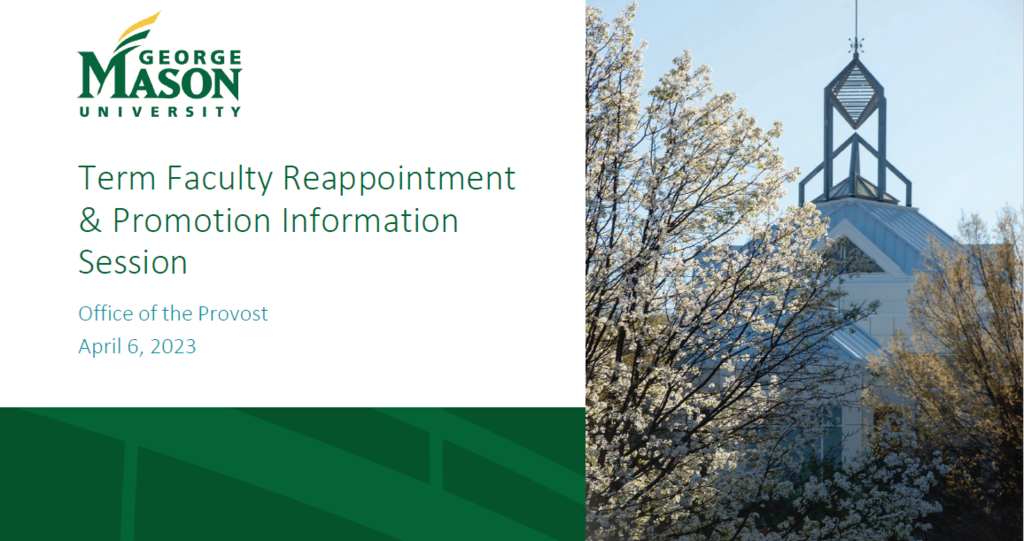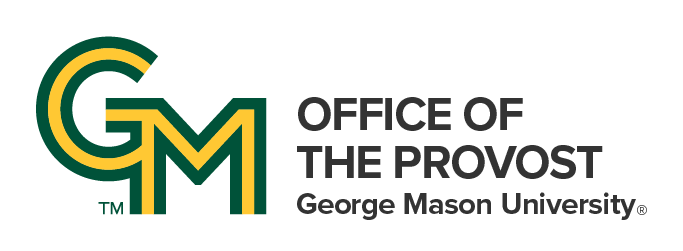
A forum on Reappointment and Promotion will be held on Tuesday, March 24, 2026 from 10:00am-11:00am on Zoom.

The Term Faculty Committee hosted Community Conversation on Tuesday, April 22, to give an update on the committee's work and gave community members a chance to share any thoughts or concerns.

Please join us for a Term Faculty Reappointment and Promotion Forum: Tuesday, March 24, 2026 from 10:00am-11:00am on Zoom.
George Mason University would be unable to thrive without our term faculty. Term faculty contribute to campus life and institutional success in a wide variety of ways, such as teaching, advising students, providing administrative leadership, university service, and more.
George Mason’s strategic vision is ambitious, seeking to achieve what few institutions have accomplished. Our goals include both strengthening our reputation as a high-caliber research-intensive institution, while simultaneously expanding our access to excellence through continuing to serve a highly diverse student population. Meeting these seemingly contradictory goals requires bold thinking about how we recruit, retain, and support all of our faculty communities.
Term faculty make up a significant portion of full-time instructional faculty at George Mason, and it is critical to create and maintain an environment that values term faculty members’ work and contributions to our teaching and scholarly communities, and national reputation. George Mason strives to be an institution where term faculty are supported in reaching their professional and career goals. To that end, we seek to:
- Promote the contributions and livelihood of term faculty through inclusive and sustainable policies and practices
- Pursue meaningful pathways for career progression and recognize the varied contributions that term faculty make to our institutional mission
- Foster an institutional culture in which term faculty positions are viewed as productive and rewarding career opportunities
Term Faculty Committee
The Term Faculty Committee was convened in fall 2019 to oversee and facilitate the implementation of the recommendations put forward by the Term Faculty Task Force. The Term Faculty Committee created Guidance for Workload Policies in Fall 2021.
Mission and Core Values
The Term Faculty Committee seeks to improve the status and quality of term faculty experiences through informing inclusive and sustainable policies and practices that promote the contributions and livelihood of the term faculty. We will pursue meaningful pathways for career progression and recognize the varied contributions that term faculty make to our institutional mission. We aim to foster an institutional culture in which term faculty positions are viewed as productive and rewarding career opportunities.
- Our work is driven by a sense of urgency in order to make meaningful progress
- We believe that all faculty have the right to participate in governance decisions that affect them
- We will operate with openness and transparency
- Our actions are designed to support term faculty well-being
- We embrace the “spirit of possibility”
Term Faculty Committee Roster
| Name | Department | Title | |
|---|---|---|---|
| Kim Eby (co-chair) | Faculty Affairs and Development | Vice Provost for Faculty Affairs & Development | keby1 |
| Jackie Brown* (co-chair) | Costello College of Business | Area Chair for Business Foundations | jbrown39 |
| Kevin Dunayer* | College of Education and Human Development College of Visual and Performing Arts |
Professor | kdunayer |
| Geraldine Grant | College of Science | Associate Professor | ggrant1 |
| Andrew Lane | Human Resources, Faculty and Staff Engagement | Director of Performance Management and Employee Engagement | alane24 |
| Lisa Lister* | College of Humanities and Social Sciences | Associate Director | llister1 |
| Marci Kinas Jerome* | College of Education and Human Development | Associate Professor | mkinas |
| Rochelle Jones* | College of Engineering and Computing | Associate Professor | rjones42 |
| Eric Waithaka* | College of Public Health | Assistant Professor | ewaithak |
* denotes term faculty member
Guidance for Term Faculty Appointments
George Mason University understands the importance of flexibility for academic units in the initial hiring of term faculty, who may be hired for initial appointment on single-year or multi-year contract. Appointments with term dates are defined below.
In accordance with section 2.7.1 of the Faculty Handbook, Term Faculty will be evaluated for a new appointment. Term faculty members are eligible for reappointment based on quality of performance and departmental resource needs and commitments, including enrollment trajectory considerations.
Single-year Appointments
Initial Appointment: Term Faculty on initial single-year appointment will be evaluated for a new appointment and receive notification from the dean in writing of the new appointment/ nonappointment three (3) months prior to the end of the appointment.
New Appointment: After the initial single year appointment, Term Faculty will be evaluated for a new appointment and receive notification from the dean in writing of the new appointment/ nonappointment five (5) months prior to the end of the appointment.
Term Faculty Single-Year Appointment Expectation: After three (3) single-year appointments, Term Faculty should be evaluated based on the portfolio of position responsibilities, primarily teaching, research, or clinical, with evidence provided for any additional responsibilities, whether leadership, administrative, or service. Term faculty with satisfactory performance should be placed on a multi-year appointment within the overall instructional needs and financial framework of the academic unit. The practice of issuing repeated one-year restricted contracts for an individual faculty member over many years is discouraged, as it can be exploitative over an extended time.
Multi-year Appointments
New Appointments: Term Faculty on current multi-year appointments will be evaluated for new appointment during the final year of their initial appointment. LAU leadership should make efforts to ensure that term faculty responsibilities are put in writing and that subsequent contract responsibilities are re-evaluated and negotiated in consultation with the term faculty member.
Deadlines for submitting these materials to the Office of the Provost are found on the Office of the Provost website. The Provost will act on the recommendation and the Term Faculty member will be notified in writing of the decision.
Term faculty must present credentials consistent with University Policy 3005: Faculty Credential Evaluation and Documentation and expectations of the Southern Association of Colleges and Schools – Commission on Colleges (SACSCOC), and also have experience appropriate to the level of the course they are teaching. It is the responsibility of the local academic unit to verify documentation of appropriate credentials for all faculty members prior to appointment.
Required Documentation for New Appointment to Multi-Year Contracts
In the case of Term Faculty who are being appointed or reappointed for multi-year contracts, documentation should focus on the portfolio of responsibilities, primarily teaching, research, or clinical, with evidence provided for any additional responsibilities, whether leadership, administrative, or service.
- Candidate’s employment chronology, particularly at George Mason, to include: date of hire, date of initial appointment to a term faculty position, and ensuing additional appointments.
- Candidate’s vita, including clear representation of all position responsibilities.
- Candidate’s professional statement, including future plans (not to exceed 8 pages).
- The candidate’s statement should reflect the primary area of focus (i.e., teaching, research, or clinical).
- The candidate’s professional statement should include commentary on additional leadership, administrative, and service activities.
For additional information, please visit Supporting Efforts to Document and Assess Teaching and Learning.
Guidance for Term Faculty Promotion
In accordance with section 2.7.3.1 of the Faculty Handbook, Term Faculty may be considered for a promotion with a new multi-year appointment, normally after five years of service. Promotion may occur within the period of a multi-year contract.
Processes and deadlines for submitting promotion materials to the Office of the Provost are found on the Office of the Provost website. The Provost will act on the recommendation for promotion. The Term Faculty member will be notified in writing of the decision. Term faculty who are promoted will be announced to the Board of Visitors.
Candidates for promotion to associate professor must demonstrate at least high competence in the focus area (instructional, research, or clinical) by the standards developed by the local academic unit and approved by the Provost. Candidates for promotion to full professor must demonstrate genuine excellence in the focus area (instructional, research, or clinical) by the standards developed by the local academic unit and approved by the provost. Click here to see Office of the Provost Guidance for Genuine Excellence in Teaching for Term Faculty.
For additional information, please visit Supporting Efforts to Document and Assess Teaching and Learning.
Casebook Template for Term Faculty
In the case of Term Faculty, evaluations are to focus on the portfolio of position responsibilities, primarily teaching, research, or clinical, with evidence provided for any additional responsibilities, whether leadership, administrative, or service.
1. Candidate’s employment chronology, particularly at GMU, to include: date of hire, date of initial appointment to a term faculty position, and ensuing additional appointments.
2. Candidate’s vita, including clear representation of all position responsibilities.
3. Candidate’s professional statement, including future plans (not to exceed 8 pages). a. The candidate’s statement should reflect the primary area of focus (i.e., teaching, research, or clinical). b. The candidate’s professional statement should include commentary on additional leadership, administrative, and service activities.
4. Please see the .pdf for specific instructions about casebook requirements for evidence of teaching effectiveness and research performance.
5. In the case of term faculty with significant administrative responsibilities, evidence of administrative service should be included. Such evidence may include: a. Examples of administrative initiatives and/or impacts b. Past performance evaluations c. Letters of support from relevant stakeholders
Promotion Guidelines
Level 1 Promotion
Term faculty whose primary area of focus is teaching should be evaluated in relation to their contracted position responsibilities. Candidates for promotion from instructional assistant professor to instructional associate professor, or from instructor to senior instructor, must demonstrate at least high competence in teaching. Applications for a candidate’s promotion are evaluated by the local academic unit (LAU), the Dean, and the Provost. Colleges and schools may elect to include a second level review. LAUs are responsible for developing and communicating standards for high competence in teaching to their faculty and those involved in each level of review.
All full-time term faculty members are expected to be engaged at the LAU and/or school/college level. Expected participation and service includes, but is not limited to, such activity as attendance at faculty meetings and participation in committees or activities relevant to their negotiated roles and responsibilities.
Many term faculty members take on significant administrative responsibilities as part of their assigned duties. In these cases, these should be defined in a contract. In cases where term faculty members have administrative responsibilities, this should be taken into account in promotion decisions. LAUs should be transparent in their criteria for successful performance of leadership and administrative responsibilities.
Level 2 Promotion
Term faculty whose primary area of focus is teaching should be evaluated in relation to their contracted position responsibilities. Candidates for promotion from instructional associate professor to instructional full professor, or from senior instructor to master instructor, must demonstrate genuine excellence in teaching. Applications for a candidate’s promotion are evaluated by the LAU, the Dean, and the Provost. Colleges and schools may elect to include a second level review. LAUs are responsible for developing and communicating standards for genuine excellence in the focus area to their faculty and those involved in each level of review.
All full-time term faculty members are expected to be engaged at the LAU and/or school/college level. Expected participation and service includes, but is not limited to, attendance at faculty meetings and participation in committees or activities relevant to their negotiated roles and responsibilities. For promotion to term full professor, candidates are expected to demonstrate some leadership for teaching and learning, whether within Mason or in the context of their professional organizations or communities.
Many term faculty members take on significant administrative responsibilities as part of their assigned duties. In these cases, these should be defined in a contract. In cases where term faculty members have administrative responsibilities, this must be taken into account in promotion decisions and units should be transparent in their criteria for successful performance of leadership and administrative responsibilities.
Demonstration of Teaching
Effective teaching is demonstrated through a combination of course and curricular materials, learning outcomes, assignments, and assessments designed to promote student learning; through review of those materials, outcomes, assignments, and assessments by knowledgeable peers and colleagues; through student evaluations of their learning experiences; and through engaging in professional/teaching development activities.
Examples of contributions to teaching include:
- Development and implementation of new courses, curricula, and programs (face-to-face, online, or hybrid)
- Use of evidence-based, innovative, inclusive, and/or high-impact teaching and assessment practices
- Development of instructional materials, including appropriate use of emerging and digital technologies
- Training and supervision of teaching (graduate) and/or learning (undergraduate) assistants
- Course coordination for courses with multiple sections
- Mentoring students, both undergraduate and graduate
- Clinical and field supervision of students
- Student academic advising
- Mentoring faculty colleagues
- Participating in educational development activities to strengthen knowledge, skills, and/or abilities
Demonstration of Institutional and Professional Engagement
Engagement at all levels of the institution and in the professional discipline will be given positive weight in personnel decisions. This engagement might take the form of service and leadership and/or engagement in professional development to enhance the student learning experience or other benefits to students and the LAU. Each LAU will make known in a timely manner its expectations for institutional and professional engagement, within the context of the promotion framework outlined above.
Examples of service and leadership contributions include:
- Advising and supporting co-curricular experiences for students
- Participating in and/or chairing committees within the LAU, college/school, or university
- Contributions to and/or leadership of relevant professional organizations, communities, and/or conferences
- Community engagement, service, and/or leadership related in some way to expertise
Examples of professional development include:
- Participating in workshops/opportunities to improve teaching and learning practices and approaches
- Participating in workshops/opportunities to enhance knowledge around a specific content domain related to professional expertise (e.g., new research methods and analyses)
- Participating in workshops/opportunities to develop leadership capacity that would enhance their Mason work
Demonstration of Research and Scholarship
The area of focus for some term faculty members is research and scholarship. Scholarly achievement can be demonstrated by original publications and peer reviewed contributions to the advancement of the discipline/field of study or of interdisciplinary/transdisciplinary questions. It can also be demonstrated by original research, artistic work, software and media, exhibitions, and performance; and by the application of discipline- or field-based knowledge to the practice of a profession.
Examples of scholarly contributions include:
- Publications (peer and non-peer reviewed), including journal articles, books, book chapters, monographs, etc. These may be within the professional discipline(s) and/or represent contributions in the form of Scholarship of Teaching and Learning (SoTL)
- Sponsored or supported research, creative activity, and professional practice; grant and contract awards
- Conference and other scholarly presentations (peer reviewed and invited)
- Artistic and professional performances and exhibits
- Intellectual property, patents, and evidence of relevant entrepreneurial activities may also be provided for consideration towards promotion
- Engagement of undergraduate and graduate students in research production and dissemination
Demonstration of Leadership/Administrative Responsibilities (if applicable)
Leadership and administrative responsibilities include the agreed-upon performance goals, as well as any new initiatives, opportunities, or projects that emerged that were not part of the original agreed-upon performance goals during the contract period(s). Term faculty should provide documentation to demonstrate that their contributions in this area fully meet the standards specified by the LAU and make a positive contribution.
